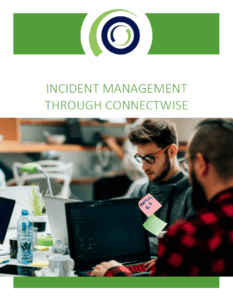The Incident Management Guide for MSPs
MSP service desks primarily work with tickets to ensure effective incident management. For example, if a service interruption occurs for an MSP’s client, a service ticket is created. Managing incidents for multiple accounts, however, is a challenge for MSPs. As such, MSPs need an incident management system to handle IT incidents from different clients under one pane of glass.
The goal of this blog is:
- To define the incident management process
- To go over the key elements of an incident management system
- To look into incident alert management tools that integrate with ConnectWise.
Why is incident management important?
Incidents are unexpected and an efficient service desk is one that is prepared to handle and solve them. The same efficient service desk must meet SLAs and satisfy customers. To achieve this, MSPs should implement an incident management system.
What does ConnectWise add to the incident management process?
ConnectWise Manage’s platform allows error-proof ticketing and powerful documentation. ConnectWise Manage gives MSPs the power to capture and track every step in the incident management process, maximize visibility, and establish workflows so you can deliver exceptional customer service.
Is there anything else required off an incident management system?
While you can catalog an incident by creating a ticket through ConnectWise, there is very little you can do to better manage the incident by simply using tickets. Furthermore, with current ConnectWise workflows, you are only able to receive a text or email when a ticket is created. This limitation inhibits a virtuous workflow and hinders the alerting process.
The answer then is to integrate ConnectWise with an incident alert management tool that lets you convert ConnectWise tickets into smart alerts that can be sent out to MSP teams, on-call teams and management whenever there is an incident.
The incident alert management tool needs to be more than just an alerting service. When you are shopping for a solution, here is a checklist that serves as a guide to getting you the most out of an incident alert management tool. Here are some must-haves of any incident alert management tool:
- Ability to integrate with ticketing tools like ConnectWise
- An on-call scheduler
- An alert escalation policy
- Failover options if escalation fails
- Secure messaging to aid team communication
- High and low-priority alerting
- The ability to track and incoming and outgoing alerts and messages
- Reporting to summarize and gain insights into historical data
CONCLUSION
The key to incident management through ConnectWise is to find an incident alert management tool that lets you differentiate alerts, automate the process of escalating alerts and schedule people in a digital schedule that manages who gets the alert based on the days of the week and the time of day. For more information download our white paper.






